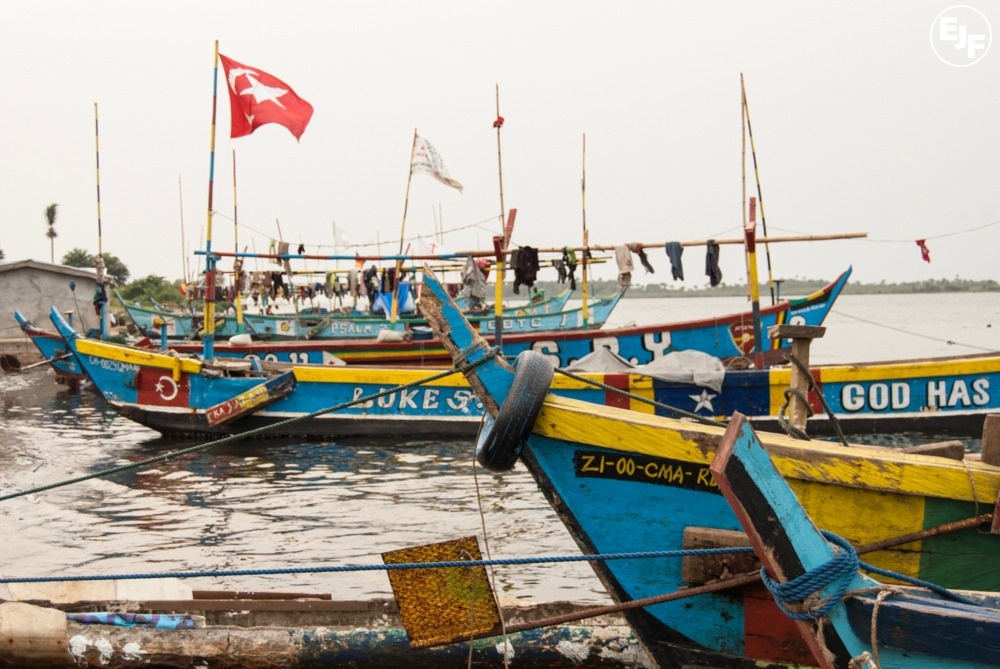
EJF responds to Liberian Government’s decision to cut inshore exclusion zone
The Environmental Justice Foundation is warning the Liberian Government that it risks undermining the country’s food security if it continues with its plan to allow industrial vessels greater access to fish in its coastal waters.
Under a new Executive Order, the government plans to halve its Inshore Exclusion Zone (IEZ), currently reserved for artisanal fishermen, reducing it from six nautical miles to just three. This will allow industrial vessels, including trawlers, to fish much closer to the shore.
65% of Liberia’s animal protein comes from the fishing sector; much of it from artisanal fleets.
Reducing the exclusion zone would see an almost inevitable rise of competition from foreign industrial vessels fishing in coastal waters, and could put the livelihoods of the 33,000 people who rely on this industry at risk.
Moreover, as most foreign catch is exported overseas, the expected reduction in levels of fish being supplied to Liberia would threaten the food security of hundreds of thousands of citizens.
“We are extremely disappointed by the government’s decision to halve the IEZ. Since its introduction, the zone has helped local fishers see a huge increase in fish catch, and in our incomes. By reducing the IEZ, the government will pave the way for industrial trawlers to re-enter our coastal waters and steal the fish that we rely on to feed our families. Local fishing communities are now mobilizing together to urge the government to reverse this damaging decision, which, if it goes ahead, will put local fishermen, their families and the entire country’s food security at risk.” The Community Management Association from Robertsport, representing artisanal fisherman in the region
Liberia’s coastal waters are also a vital spawning and breeding ground for many species of fish. Allowing trawlers so close to the coast would endanger the region’s fragile marine ecosystems, further compromising the long-term sustainability of fish stocks in Liberian waters.
“By removing the six nautical mile limit, the Liberian government is favouring short-term economic interests over the needs of its people. The limit underpins the sustainability of the fisheries that provide vital food, livelihoods and incomes for hundreds of thousands of Liberians. Removing it threatens the very survival of these fisheries, and the well-being of all those who depend on them.” EJF Executive Director Steve Trent
EJF is urging the Government of Liberia to reconsider the proposal to halve its IEZ and to safeguard this vital tool for current and future generations of coastal communities.
Notes to editors:
- Executive Order No. 84 – Pertaining to The Management of Liberia Fishery Resources established that the Maritime Authority is granted full and complete supervisory, oversight and fiscal authority of the Bureau of National Fisheries and that the Inshore Exclusion Zone (IEZ) – referred to in the order as the Inshore Exclusive Zone - will be reduced from six nautical miles to three nautical miles.
- The 6NM IEZ was introduced by the Government of Liberia in 2010 as part of the country’s Fishing Regulation. Prior to its introduction, during the 1990s and 2000s foreign vessels could fish up to 3NM off the Liberian coastline, often raking the seabed and destroying local ecosystems in the search for high-value commercial species such as yellow croaker, which are found close to shore. This often caused major conflict between foreign trawlers and the country’s artisanal fishing fleet. Since 2010, when the exclusion zone was introduced, artisanal fishers in Liberia have reported improved catch, increased incomes, a decrease in conflict with industrial trawlers, a reduction of the loss of equipment and an increase in safety at sea.
- According to the Bureau of National Fisheries (BNF) there are approximately 3,300 canoes and more than 11,000 fishers operating from 114 fish landing sites along Liberia’s 579km coastline and about 33,000 people directly dependant on marine fisheries for their employment and income.
- 65% of Liberia’s animal protein comes from the fishing sector according to the UN Food and Agricultural Organisation and some 80% of the population depends on cheap fish for their main source of protein intake according to the World Food Programme. According to the Global Hunger Index, 31.9% of Liberia’s population is classified as undernourished, while 16% of families are classed as food insecure by the World Food Programme. The World Food Programme also found that 83% of the population live on less than US$1.25 a day.
- Other neighbouring countries have undertaken similar measures in the past allowing industrial vessels to fish close to the shore. This has resulted in significant damage to their fragile marine ecosystems, and to an increase in overfishing and illegal fishing, greatly jeopardising the livelihoods, incomes and food supply of coastal populations. The foreign fleets that most commonly operate these industrial trawlers are not interested in the sustainability of the fish stocks but in short-term profitability. These fleets are well-known for their illegal activities and for exporting their catch to international markets, mainly in south-east Asia, robbing local populations of an invaluable source of protein and putting their food security at risk.
SIGN UP FOR OUR EMAILS AND STAY UP TO DATE WITH EJF